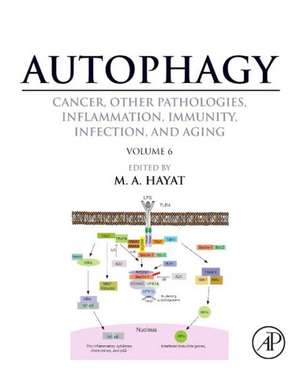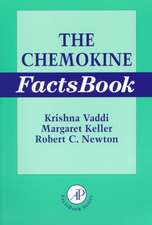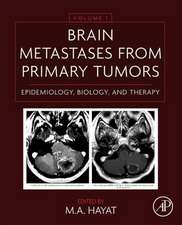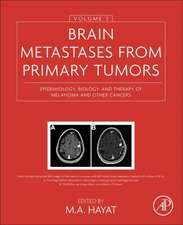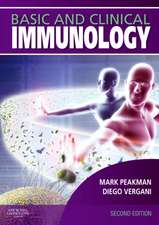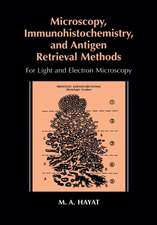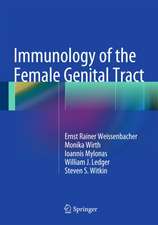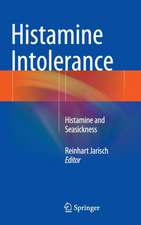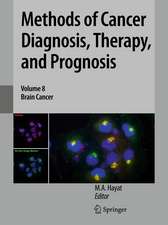Autophagy: Cancer, Other Pathologies, Inflammation, Immunity, Infection, and Aging: Volume 6- Regulation of Autophagy and Selective Autophagy
Editat de M. A. Hayaten Limba Engleză Hardback – 6 ian 2015
The significance of autophagy in host defense is elucidated, providing a specific focus on facilitation of antigen presentation; participation in thymic development; and the sharing of regulatory nodes with innate immunity. Selective autophagy for the degradation of mitochondria and endocytosed gap junctions are also explored.
This book is an asset to newcomers as a concise overview of the regulation of autophagy, its role in host defense and immunity, and selective autophagy, while serving as an excellent reference for more experienced scientists and clinicians looking to update their knowledge.
Volumes in the Series
Volume 1: Molecular Mechanisms. Elucidates autophagy’s association with numerous biological processes, including cellular development and differentiation, cancer, immunity, infectious diseases, inflammation, maintenance of homeostasis, response to cellular stress, and degenerative diseases such as Alzheimer’s, Parkinson's, Huntington's, amyotrophic lateral sclerosis, and prion diseases. Volume 2: Role in General Diseases. Describes the various aspects of the complex process of autophagy in a myriad of devastating human diseases, expanding from a discussion of essential autophagic functions into the role of autophagy in proteins, pathogens, immunity, and general diseases. Volume 3: Role in Specific Diseases. Explores the role of autophagy in specific diseases and developments, including: Crohn’s Disease, Gaucher Disease, Huntington’s Disease, HCV infection, osteoarthritis, and liver injury, with a full section devoted to in-depth exploration of autophagy in tumor development and cancer, as well as the relationship between autophagy and apoptosis.Volume 4: Mitophagy. Presents detailed information on the role of mitophagy, the selective autophagy of mitochondria, in health and disease, by delivering an in-depth treatment of the molecular mechanisms involved in mitophagy initiation and execution, as well as the role of mitophagy in Parkinson Disease, cardiac aging, and skeletal muscle atrophy. Volume 5: Role in Human Diseases. Comprehensively describes the role of autophagy in human diseases, delivering coverage of the antitumor and protumor roles of autophagy; the therapeutic inhibition of autophagy in cancer; and the duality of autophagy’s effects in various cardiovascular, metabolic, and neurodegenerative disorders.Volume 6: Regulation of Autophagy and Selective Autophagy. Provides coverage of the mechanisms of regulation of autophagy; intracellular pathogen use of the autophagy mechanism; the role of autophagy in host immunity; and selective autophagy. Volume 7: Role of Autophagy in Therapeutic Applications. Provides coverage of the latest developments in autophagosome biogenesis and regulation; the role of autophagy in protein quality control; the role of autophagy in apoptosis; autophagy in the cardiovascular system; and the relationships between autophagy and lifestyle. Volume 8: Autophagy and Human Diseases. Reviews recent advancements in the molecular mechanisms underlying a large number of genetic and epigenetic diseases and abnormalities, and introduces new, more effective therapeutic strategies, in the development of targeted drugs and programmed cell death, providing information that will aid on preventing detrimental inflammation.Volume 9: Necrosis and Inflammation in Human Diseases. Emphasizes the role of Autophagy in necrosis and inflammation, explaining in detail the molecular mechanism(s) underlying the formation of autophagosomes, including the progression of Omegasomes to autophagosomes.
- Bings together a wide swathe of experts (oncologists, neurosurgeons, physicians, research scientists, and pathologists) in the field of autophagy to discuss recent developments in this rapidly-advancing field
- Discuses role of autophagy in immunity, with coverage of toll-like receptors as activators for autophagy; role in antigen processing; and control of production and secretion of il-1B
- Covers role of autophagy receptors in mitophagy; role of parkin and pink1 in mitochondrial quality control; and the degradation of endocytosed gap junctions
- Organized for readers into easy-to-access sections: autophagy and molecular mechanisms; autophagy and intracellular pathogens; autophagy and immunity; and general applications
| Toate formatele și edițiile | Preț | Express |
|---|---|---|
| Hardback (10) | 766.89 lei 36-50 zile | |
| ELSEVIER SCIENCE – 30 sep 2014 | 766.89 lei 36-50 zile | |
| ELSEVIER SCIENCE – 7 mar 2014 | 812.83 lei 36-50 zile | |
| ELSEVIER SCIENCE – 12 aug 2014 | 842.86 lei 36-50 zile | |
| ELSEVIER SCIENCE – 6 ian 2015 | 844.38 lei 36-50 zile | |
| ELSEVIER SCIENCE – 14 iun 2016 | 844.46 lei 36-50 zile | |
| ELSEVIER SCIENCE – 30 sep 2013 | 846.00 lei 36-50 zile | |
| ELSEVIER SCIENCE – 16 ian 2017 | 852.32 lei 36-50 zile | |
| ELSEVIER SCIENCE – 29 sep 2017 | 862.05 lei 36-50 zile | |
| ELSEVIER SCIENCE – 25 feb 2016 | 931.25 lei 36-50 zile | |
| ELSEVIER SCIENCE – 9 iun 2016 | 931.68 lei 36-50 zile |
Preț: 844.38 lei
Preț vechi: 1055.46 lei
-20% Nou
Puncte Express: 1267
Preț estimativ în valută:
161.57€ • 169.15$ • 133.69£
161.57€ • 169.15$ • 133.69£
Carte tipărită la comandă
Livrare economică 31 martie-14 aprilie
Preluare comenzi: 021 569.72.76
Specificații
ISBN-13: 9780128010327
ISBN-10: 0128010320
Pagini: 338
Dimensiuni: 191 x 235 x 22 mm
Editura: ELSEVIER SCIENCE
ISBN-10: 0128010320
Pagini: 338
Dimensiuni: 191 x 235 x 22 mm
Editura: ELSEVIER SCIENCE
Public țintă
Academic/clinical professors, post-doctoral fellows, graduate and medical students in immunology, pathology, infectious diseases, cancer research, oncology, pathology, biology, bioinformatics, endocrinology, gastroenterology, reproductive oncology and public health, industries in drugs developmentCuprins
Autophagy and Molecular MechanismsIntroduction1. Regulation of autophagy by amino acids2. Regulation of autophagy by amino acid starvation involving ca2+3. Regulation of autophagy by micrornas4. Mechanisms of cross-talk between intracellular protein degradation pathways5. Cross-talk between autophagy and apoptosis in adipose tissue: role of ghrelinAutophagy and Intracellular Pathogens6. Intracellular pathogen invasion of the host cells: role of the alfa-hemolysin induced autophagy7. Modulation of autophagy by herpesvirus proteins8. Autophagy induced by varicella-zoster virus and the maintenance of cellular homeostasis9. Autophagy and hepatitis b virusAutophagy and Immunity10. Toll-like receptors serve as activators for autophagy in macrophages helping to facilitate innate immunity11. Autophagy in antigen processing for mhc presentation to t cells12. Autophagy controls the production and secretion of il-1β: underlying mechanisms13. Role of autophagy in p2x7 receptor-mediated maturation and unconventional secretion of il-1β in microglia14. Autophagy restricts interleukin-1β signaling via regulation of p62 stability15. The role of autophagy in the thymic epitheliumAutophagy: General Applications 16. The role of autophagy receptors in mitophagy17. The role of parkin and pink1 in mitochondrial quality control18. Autophagy degrades endocytosed gap junctions
Recenzii
"Editor Hayat presents this first volume of a four-volume series on autophagic processes, with an introduction to the series giving a broad overview of autophagy in the healthy state and a selection of disease states. This volume focuses primarily on the role of autophagy in chronic diseases and cancer." --ProtoView.com, February 2014
